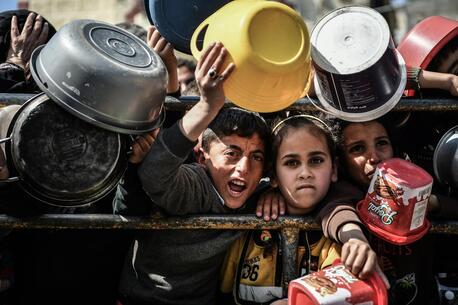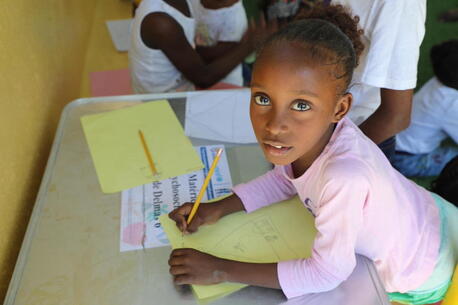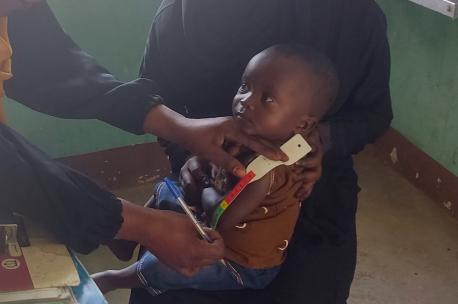
Meeting Urgent Needs in Sudan
The ongoing conflict is pushing already vulnerable children and women deeper into hardship. UNICEF is there.
One hundred and ninety children were killed in the first 11 days of conflict in Sudan, and another 1,700 injured, according to initial reports from health facilities in Khartoum and Darfur. "[T]he reality is likely to be much worse," UNICEF spokesperson James Elder said during a May 5 press briefing in Geneva.
The intense fighting inside Sudan, which first erupted on April 15, has made it increasingly difficult to get emergency supplies to children and families in need. Households are running low on food, fuel and cash, while prices of basic commodities have risen by 40 to 60 percent in some areas.
Conditions have dramatically increased the risk of malnutrition among children and the threat of violence, including gender-based violence against women and girls, UNICEF warns.
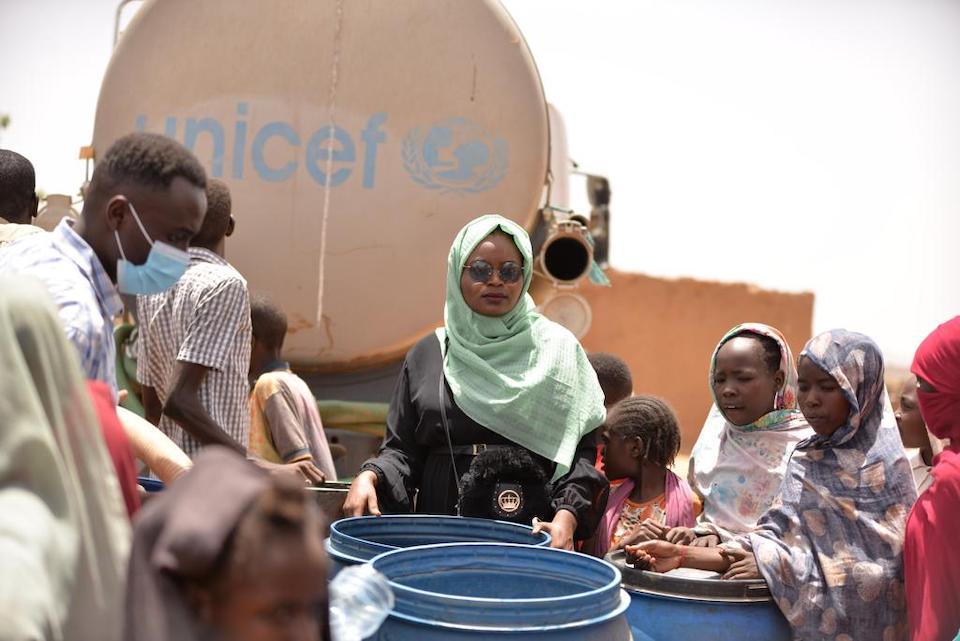
Access to safe drinking water remains a major challenge in conflict-affected areas, increasing the risk of waterborne diseases such as cholera. Several neighborhoods in Khartoum face severe shortages of water due to power outages, lack of fuel and damage to water systems.
UNICEF estimates that the number of people in need of humanitarian assistance in Sudan has increased by 5 million — roughly half of them children — as a result of the conflict, bringing the total number of those in need to 15.6 million, including 8.5 million children. Tens of thousands of Sudanese have already fled into Central African Republic, Chad, Egypt, Ethiopia and South Sudan — countries already facing crises of their own — and their numbers continue to climb.
Fleeing to countries already suffering multiple humanitarian crises of their own
Chad, for example, is already hosting more than 600,000 refugees, while UNICEF's humanitarian appeal for the country remains only 3 percent funded. Egypt currently hosts 9 million migrants and refugees, an estimated 1 million of them considered vulnerable. With the onset of the rainy season, the situation is only expected to get worse as roads close due to floods, and cholera and other disease risks increase.
Read more about UNICEF's response in refugee host countries.
UNICEF: on the ground inside Sudan working with partners to address urgent and growing needs for water, health care, nutrition, protection
UNICEF is actively responding to the emergency in Sudan, providing critical support in health, nutrition, water, sanitation and hygiene (WASH). Alongside partners, UNICEF is focused on providing urgent assistance in White Nile, Blue Nile, Gadaref, Kassala, and Red Sea, states with no ongoing conflict and where the largest numbers of newly displaced are gathering.
UNICEF's efforts have been instrumental in securing vital vaccines and critical medicines, sustaining health services, and addressing the challenges of limited access to water supplies and nutrition across affected areas.
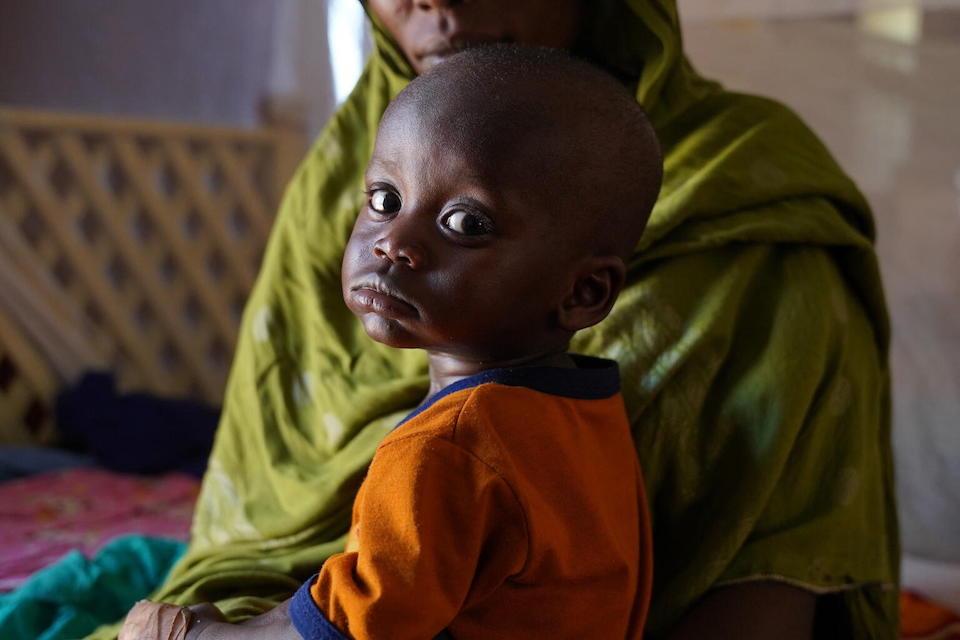
Priority interventions for the emergency response in Sudan
Inside Sudan, UNICEF is focusing on:
- providing emergency health kits, essential supplies and medicines to hospitals and health care centers to support the treatment of the injured and help maintain essential services — including immunizations
- working to secure the cold chain, including by providing fuel, to save millions of doses of vaccines and vital
medications - supporting existing nutrition interventions, including treatment of children with severe acute malnutrition to keep those lifesaving services going; current stocks of Ready-to-Use Therapeutic Food (RUTF) are only sufficient through July
- providing safe water to hospitals and health care centers through water trucking; in Khartoum, for example, UNICEF has provided WASH support to six hospitals in coordination with the Ministry of Health
- providing water treatment chemicals, water tanks, and collapsible containers to the State Ministry of Health in Khartoum to sustain WASH services
UNICEF child protection teams are also working with partners to identify unaccompanied and separated children, support family tracing and reunification and prevent and respond to sexual and gender-based violence.
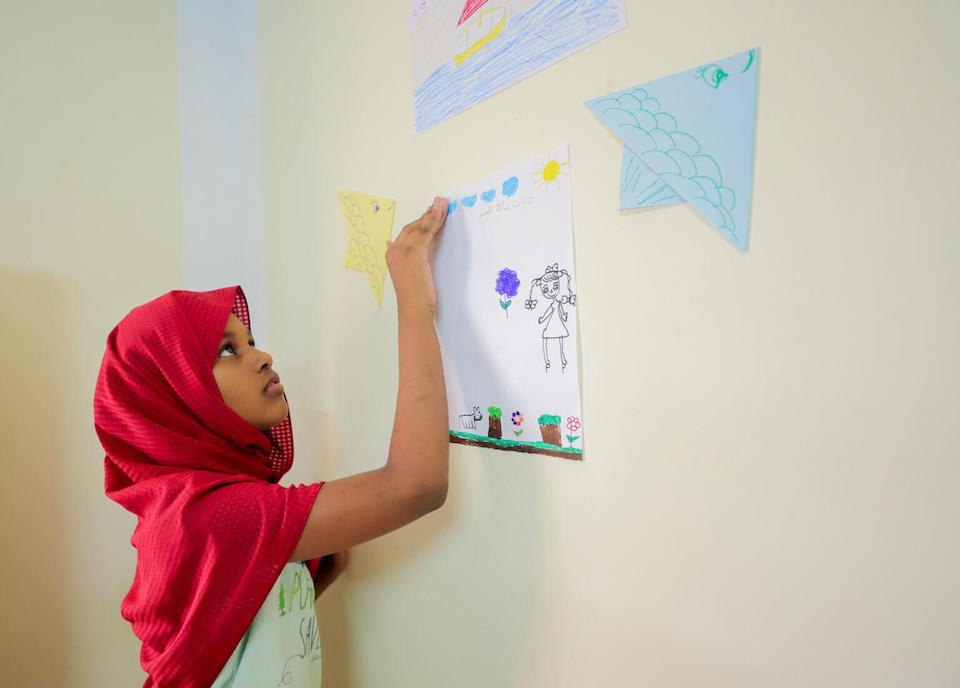
Learning crisis deepening for children already out of school in Sudan
Nearly 7 million school-age children were already out of school before the conflict — 1 in 3 girls and 1 in 4 boys. With schools in conflict-affected areas are mostly closed, these numbers are only expected to go up, increasing risks of physical and mental harm, including recruitment into armed groups.
UNICEF and partners are setting up Child-Friendly Spaces where displaced children can continue learning, and also play and interact with each other in a safe environment, while receiving mental health and psychosocial support.
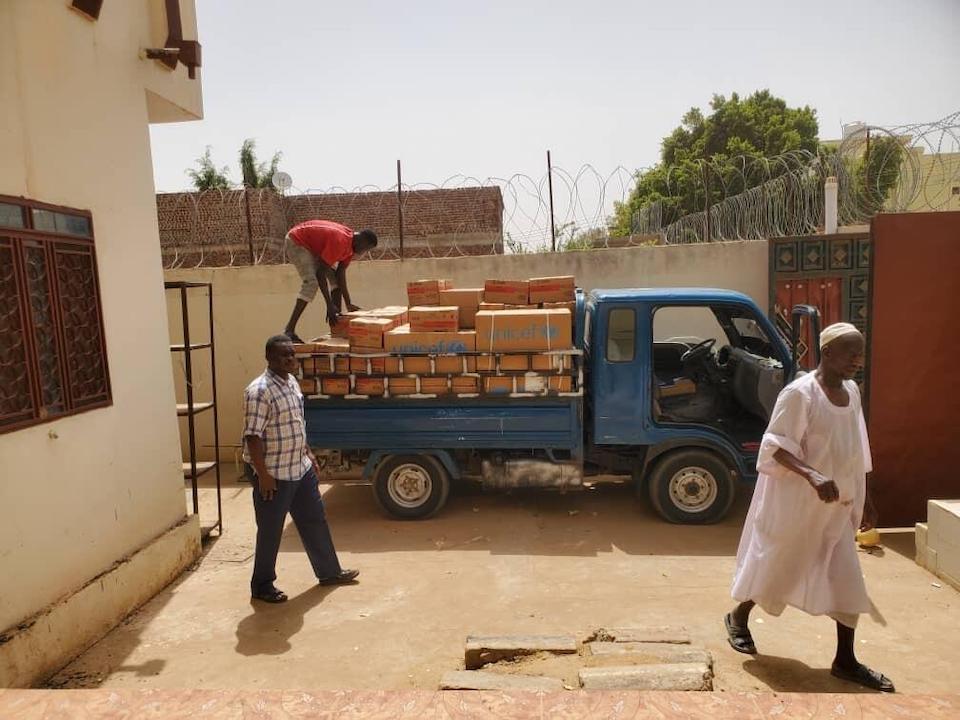
Actively exploring alternative entry points and ways to deliver for children caught in conflict hotspots
Working with local partners, staff and communities on the ground, UNICEF is striving to keep essential services going for children in conflict hotspots despite security issues and logistical challenges, by exploring alternative entry points and ways of delivering to and within Sudan.
While prepositioned supplies in UNICEF warehouses and government counterpart warehouses throughout the country allowed for an initial response, insecurity, looting, a fuel shortage and the targeting of large vehicles has limited access to warehouses and made it difficult to dispatch and to replenish supplies. With the main airport closed, air shipments have been diverted, and while sea shipments continue to Port Sudan for now, the situation remains volatile.
"Children have now been living amid terrifying violence for three weeks in Sudan," Elder said. "Places where they simply must be safe – homes, schools and hospitals – have consistently come under attack, and continue to do so. Time and again UNICEF and partners have called on parties to the conflict to stop all attacks on health centers, schools, and water and sanitation systems upon which children rely. Time and again the attacks continue.
"Humanitarian workers have also been attacked, while humanitarian facilities, vehicles and supplies – including those of UNICEF – have been looted or destroyed. All such attacks undermine our capacity to reach children across the country with lifesaving health, nutrition, water and sanitation services."
In the most recent situation report dated May 4, UNICEF stated it would maintain some critical and lifesaving basic services in Khartoum and the Darfurs through local partners and staff on the ground — but to do this, it needed a ceasefire to hold.
"Again," Elder said, "we join so many others in underlining the criticality that all parties to the conflict adhere to international law: to fulfill their obligations to protect children, and to ensure that humanitarian actors can safely operate on the ground to support civilians in need.”
Without timely, flexible funding resources, the most vulnerable and affected children, young people and families will suffer greater exposure to the impacts of the fighting in Sudan and limited access to critical services and protection.
Help UNICEF reach children caught in conflict with lifesaving support and protection. Donate today.

